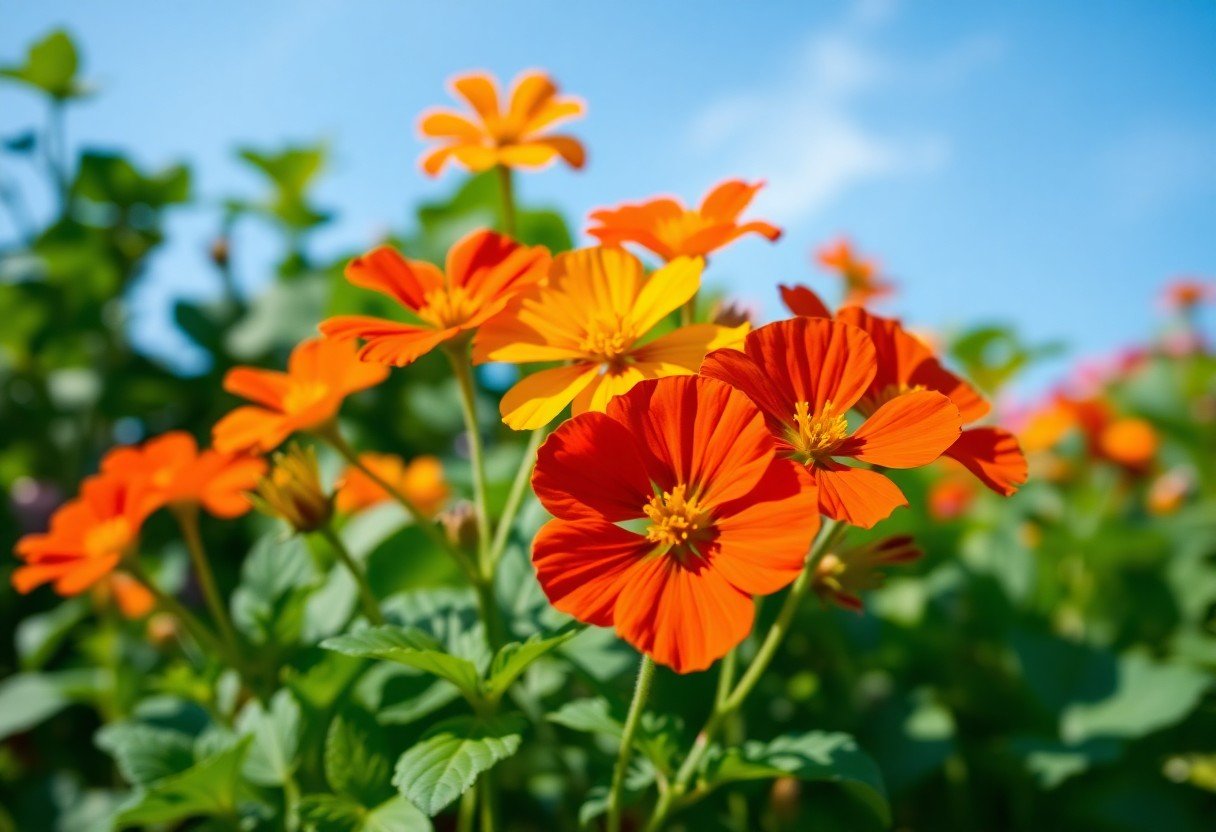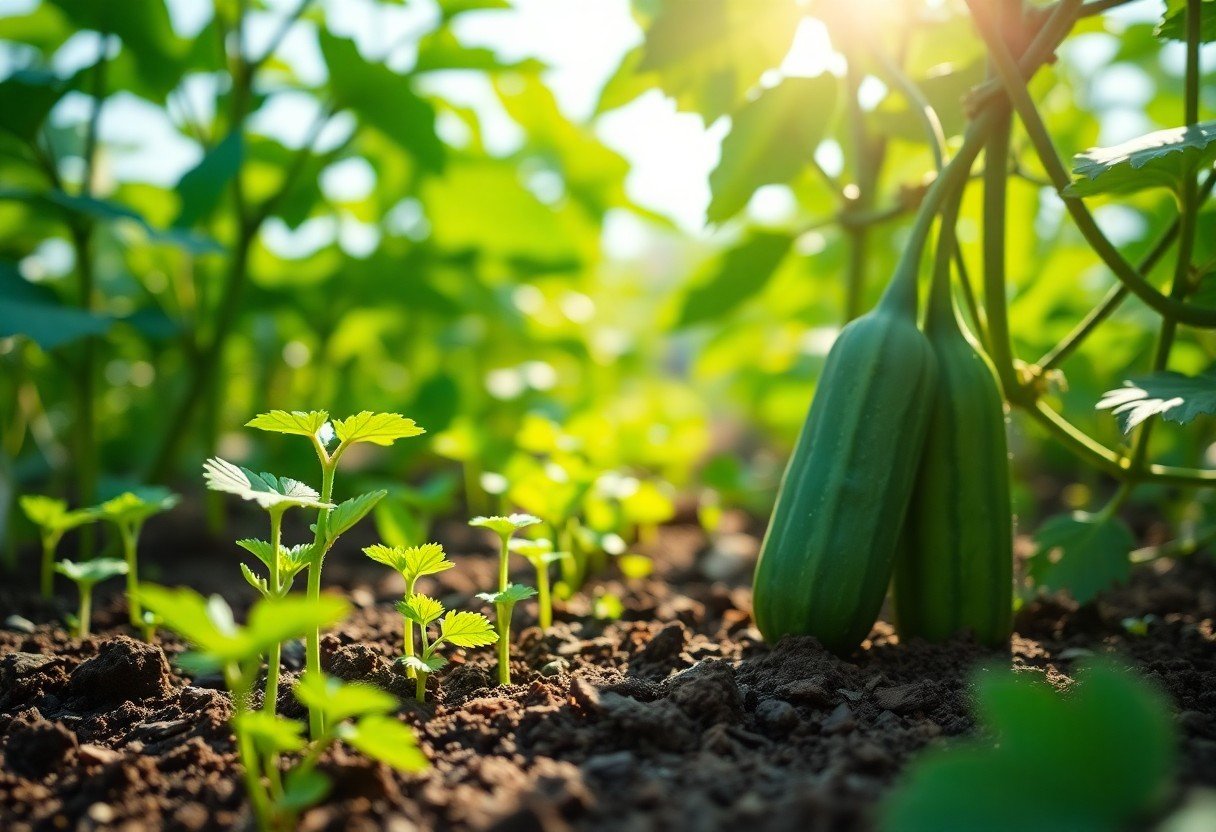It’s time to investigate the enchanting world of morning glories, where you can nurture these stunning flowers from seed to their breathtaking sunrise blooms. In this post, you’ll discover necessary tips and techniques for growing morning glories in your garden, ensuring that you enjoy their vibrant colors and captivating beauty all season long. Whether you’re a novice gardener or an experienced green thumb, you’ll find valuable insights to help you cultivate your morning glory patch for a truly spectacular display.
Key Takeaways:
- Explores the transformative journey of beauty, emphasizing the stages of growth from seed to bloom.
- Highlights the importance of nurturing both inner and outer beauty, focusing on self-care and personal development.
- Encourages readers to embrace the natural rhythms of life, fostering a deeper connection with nature and oneself.

The Fascinating World of Morning Glories
While morning glories awaken with the dawn, this enchanting family of climbing plants holds much more than just ephemeral blooms. Known for their stunning colors and captivating growth habits, these flowers have fascinated gardeners and botanists alike for centuries, each revealing a part of their rich story as you explore their world.
History and Cultural Significance
Across various cultures, morning glories have been celebrated for their beauty and symbolic meanings. In ancient China, they represented love and affection, while in Mexico, legend associates them with dreams and wishes. By cultivating this plant, you connect to a lineage of admiration and appreciation across time and space.
Botanical Classification and Varieties
Around the globe, morning glories belong to the Convolvulaceae family, with over 1,000 species identified. Among these, the most popular varieties such as Ipomoea purpurea and Ipomoea tricolor showcase vibrant blooms, each differing in color, size, and growth habit, allowing you to choose the perfect type for your garden.
Further exploring the classification, you’ll discover that morning glories can be annual or perennial, climbing or trailing, and come in a rainbow of hues including blue, purple, pink, and white. Some species may even have unique patterns or shapes, ensuring that your garden can reflect your personal aesthetic and aspirations.
Characteristics of Morning Glory Plants
Around the world, morning glories are known for their heart-shaped leaves and rapid growth, creating lush green coverage on trellises and fences. Their funnel-shaped flowers bloom early in the day, inviting pollinators to your garden and offering a vibrant show as the sun rises.
Their adaptability to various climates allows morning glories to thrive in numerous environments, proving them to be robust garden companions. With vines that can extend from a few feet to over 10 feet in a single season, you may find countless ways to integrate their enchanting presence into your landscape, enhancing your outdoor experience with beautiful blooms and intriguing foliage.
Preparing for Planting
Any successful planting endeavor begins with thorough preparation. This stage sets the foundation for vibrant blooms and healthy growth, ensuring your morning glory plants thrive as they awaken with the sunrise.
Selecting the Right Seeds
For your garden, selecting the right seeds is crucial for achieving the desired beauty and growth. Consider factors like your climate, soil type, and the specific variety of morning glory that best suits your garden’s aesthetic and functional needs.
Choosing the Ideal Location
After you’ve chosen your seeds, the next step is to choose the ideal location for planting. Morning glories thrive in areas where they can bask in full sunlight for at least 6 hours each day; therefore, make sure to identify spots that receive ample exposure and warmth.
Right conditions are crucial for flourishing morning glories. Look for a site that provides protection from extreme winds and unwanted shade, ensuring your plants have the necessary light and warmth to encourage healthy growth. Consider nearby structures or taller plants that could obstruct sunlight as you assess your planting area.
Soil Preparation and Nutrient Requirements
Preparing the soil for your morning glories involves ensuring it has the right texture and nutrients. Aim for well-drained soil rich in organic matter to promote robust root development.
To create optimal conditions, test your soil’s pH and amend as needed, adding compost or organic fertilizers that can enhance nutrient content. Proper soil preparation not only fosters healthy roots but also establishes a thriving environment, allowing your morning glories to flourish as they reach for the sunlight.
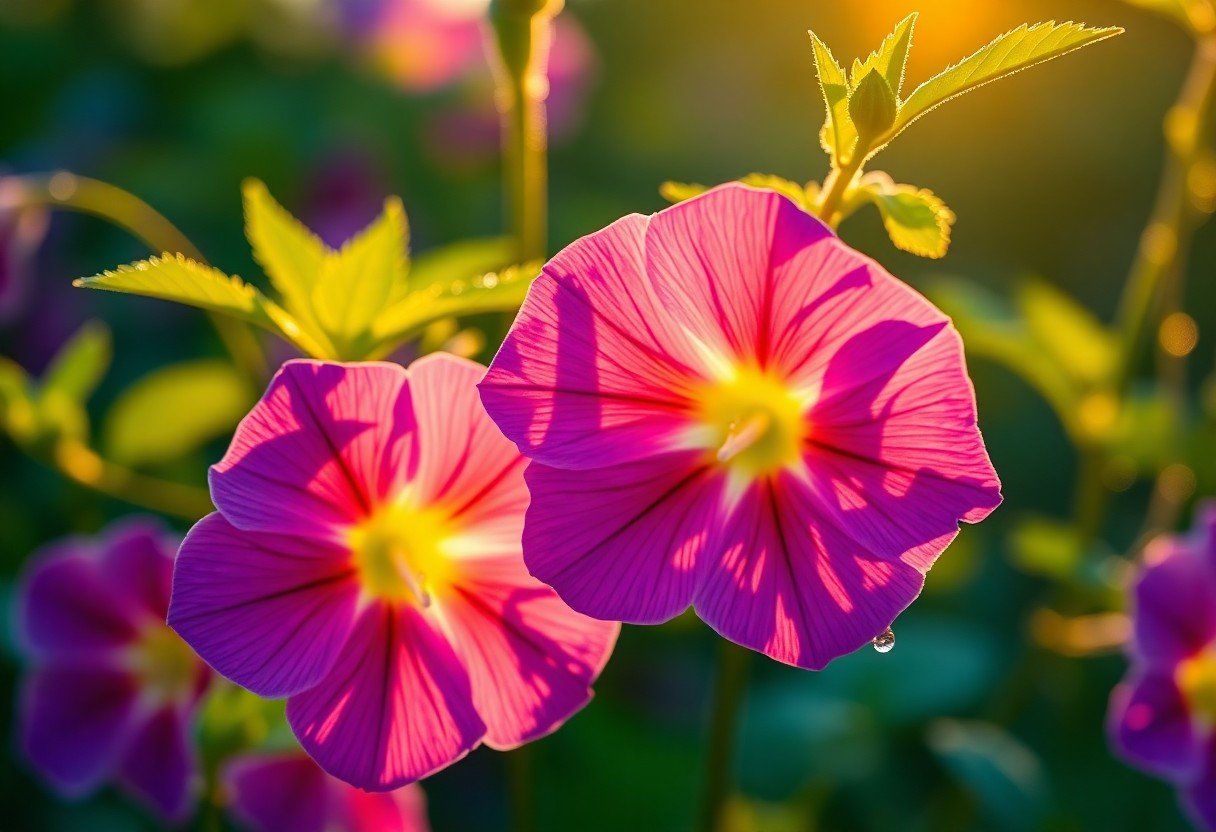
Planting Techniques
Many factors come into play when it comes to successfully planting your morning glory seeds or seedlings. Understanding the various techniques available can enhance your gardening experience and lead to a flourishing display of beauty by sunrise.
Optimal Planting Timeframe
With spring’s arrival, the optimal planting timeframe for morning glories begins after the last frost. As the soil warms, aim to sow your seeds or transplant seedlings when nighttime temperatures consistently reach above 50°F; this will ensure a healthy start for your blooms.
Sowing Seeds vs. Transplanting Seedlings
After deciding whether to sow seeds directly or transplant seedlings, you can determine the best method for your garden. Each approach has its merits, depending on your growing conditions and available time.
Seedlings are typically quicker to bloom, as they give you a head start by circumventing the germination phase. If you choose to transplant, ensure that you harden off your seedlings for about a week beforehand. On the other hand, sowing seeds directly into your garden allows for a more natural growth cycle and often results in stronger plants that acclimate better to your specific environment.
Watering and Mulching Strategies
Optimal watering and mulching strategies are imperative to ensure your morning glories thrive. Water the soil deeply once a week during dry spells, making sure not to over-saturate, as morning glories prefer well-drained soils.
Watering should focus on the base of the plants, as this encourages deep root growth. Adding a layer of mulch around your morning glories helps retain soil moisture, suppress weeds, and maintain a consistent temperature. This simple practice can promote healthier plants and enhance your garden’s overall appearance.
Nurturing Growth
Unlike many plants, morning glories require specific conditions to flourish. Understanding how to provide the right light and temperature will set the stage for their vibrant blooms.
Light and Temperature Conditions
Any gardener knows that light and temperature are vital for plant growth, especially for morning glories. Below you’ll find the optimal conditions necessary for your plants to thrive:
| Light Requirement | Full sun (6-8 hours daily) |
| Ideal Temperature | 70°F to 85°F (21°C to 29°C) |
Fertilization Practices for Healthy Blooms
Behind every stunning morning glory bloom is a solid fertilization strategy. You need to provide the right nutrients at the right times to ensure your plants flourish.
For instance, using a balanced fertilizer that is high in phosphorus will promote blooming, while nitrogen-rich formulations can encourage leafy growth. It’s best to apply fertilizer during the early growing season and to follow the manufacturer’s instructions to avoid over-fertilization, which can lead to unwanted foliage at the expense of flowers.
Pest Control and Disease Management
The presence of pests can disrupt the growth of your morning glories. Identifying and managing pest issues early on is important for the health of your garden.
Healthy morning glories are less susceptible to diseases and pest infestations. Regularly scouting your plants for signs of trouble, such as discoloration or unusual spots, allows you to take action quickly. Organic solutions, such as insecticidal soap or neem oil, can help manage pests without harming beneficial insects. Additionally, maintaining good air circulation and avoiding overhead watering can reduce disease risks.
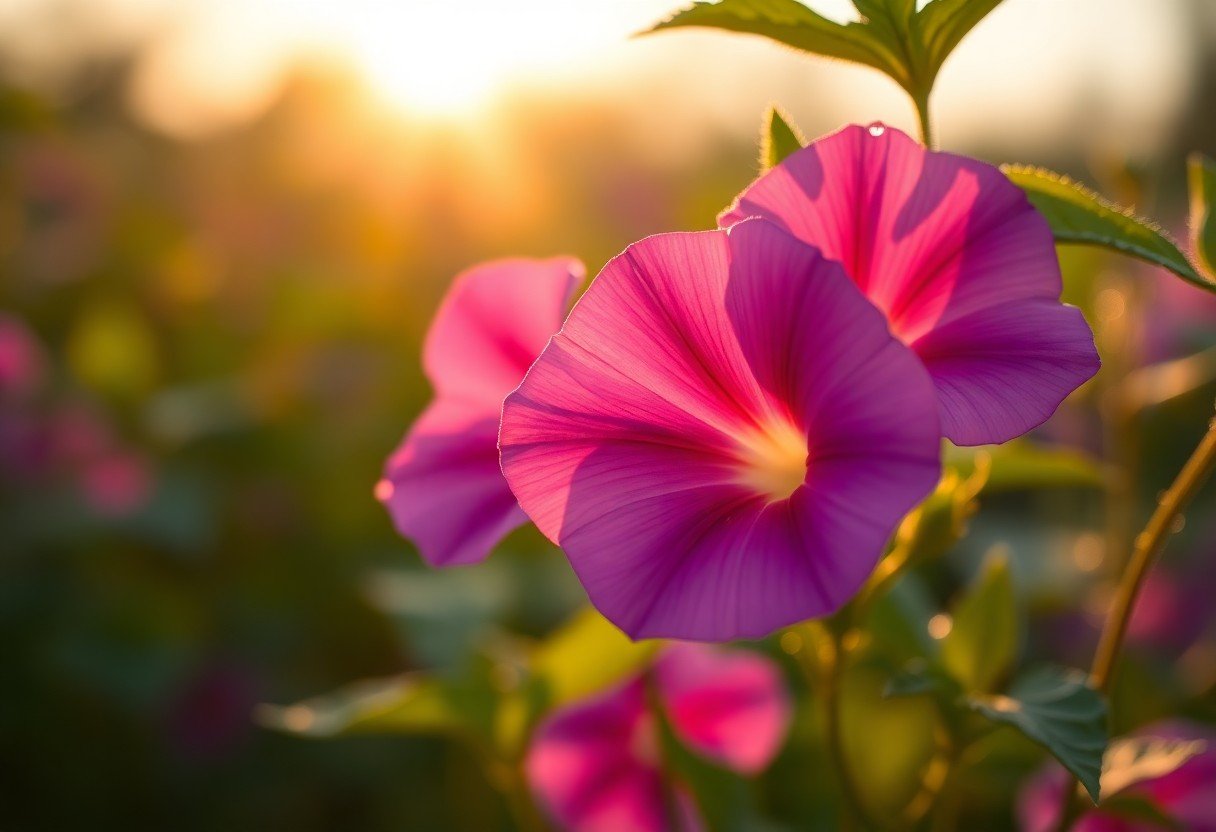
The Beauty of Blooming
Keep your eyes open for the remarkable transformation that occurs as morning glories unfurl each dawn, showcasing their captivating beauty.
Flower Colors and Patterns
Patterns on morning glory flowers can vary widely, from vibrant solids to intricate stripes and speckles. These delightful designs not only seduce the eye but also play a vital role in attracting pollinators. As you observe these flowers, you’ll appreciate how their diverse hues and textures create a stunning tapestry in your garden.
Morning Glory Blooms: Timing and Duration
Below the surface of your garden lies an intricate schedule, as morning glories typically bloom in the early hours. Their blossoms begin to unfurl just as the sun rises, reaching full display by mid-morning, and gently closing as the day draws to a close. This dynamic relationship with the sun enhances both their beauty and your connection to nature.
The duration of morning glory blooms can vary based on environmental conditions, usually lasting a single day. Yet, a well-tended plant will continue to produce new blooms reliably each morning, extending the display of color and life in your garden. This rhythm of growth invites you to engage with the changing landscape around you each day.
Attracting Pollinators and Beneficial Insects
Morning glories have an innate ability to draw in pollinators and beneficial insects, enhancing not only their own growth but also the health of your entire garden ecosystem. You’ll find that these stunning blooms create a vibrant hub of activity in your green space.
For instance, the trumpet-like shape of morning glory flowers is perfectly designed to attract hummingbirds, bees, and butterflies, all of whom play a significant role in pollination. By incorporating these enchanting plants into your garden, you are promoting biodiversity and nurturing an environment where these crucial creatures can thrive, bringing your garden’s beauty full circle.
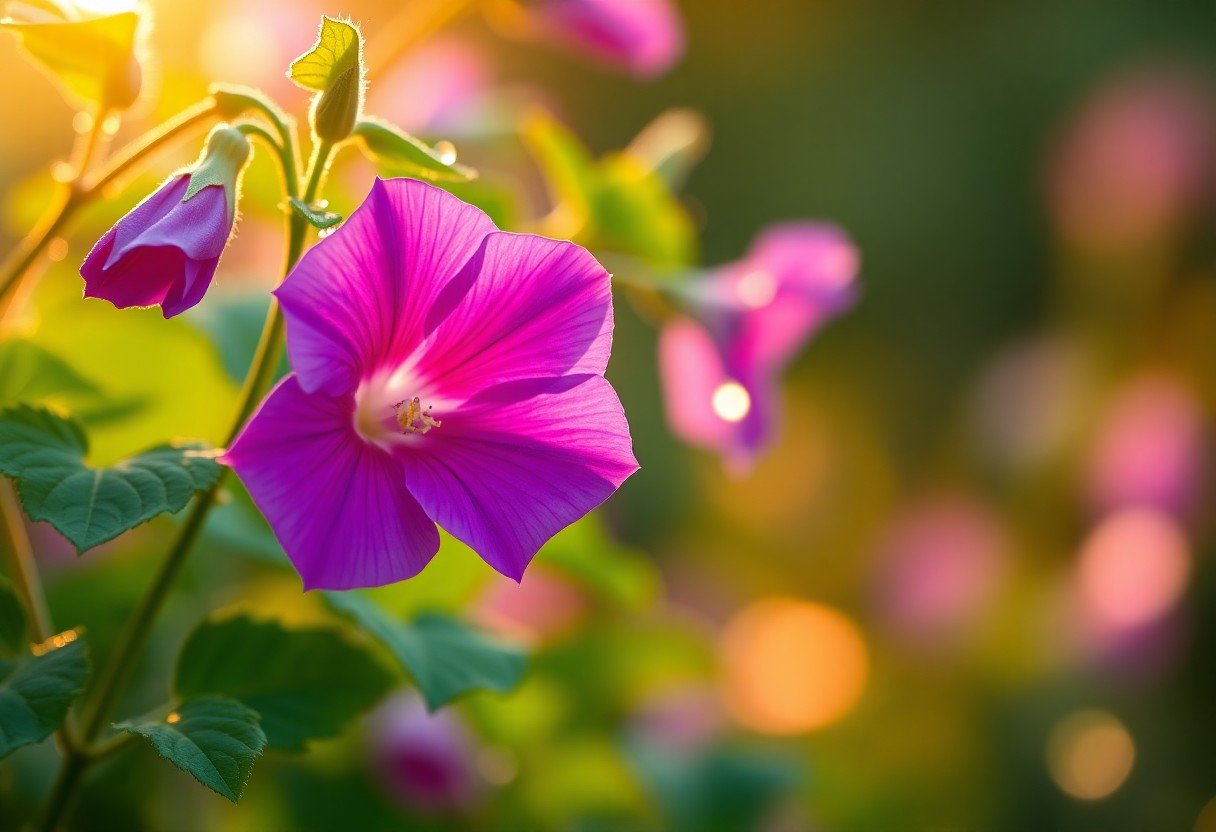
Harvesting and Seed Saving
Now, as your beautiful morning glories transition from blooming to shedding seeds, it’s the perfect moment to examine harvesting and seed saving. This process not only ensures the continuation of your garden’s beauty but also connects you with the earth and cycles of nature.
Collecting Seed Pods
Against the backdrop of fading blooms, you’ll notice the formation of seed pods — a captivating sign of your flowers’ lifecycle. To collect these pods effectively, wait until they dry out and start to split. Gently twist them off the vine, ensuring not to damage the plant. This careful harvesting preserves the integrity of your morning glories while providing valuable seeds for the future.
Storing Seeds for Future Planting
Seeds need proper care to thrive beyond their initial growth. Store your harvested seeds in a cool, dry place to ensure their viability for next planting season. Using paper envelopes or small glass jars can help maintain their condition, offering you a reliable stash for your future garden ambitions.
Seeds are best kept in a dark environment to prevent light exposure, while maintaining low humidity to avoid mold or deterioration. You can label each container with the plant variety and the date of collection, facilitating quick identification when you are ready to sow them again. This simple organization ensures that your seed collection remains healthy and accessible for the next growing cycle.
Propagation Techniques for Gardeners
Saving seeds is just the beginning; understanding propagation techniques is important for maximizing your garden’s potential. You can choose methods like direct sowing, transplanting seedlings, or using cuttings from existing plants to expand your collection and enjoy an even more vibrant display in your garden.
Also, consider experimenting with various propagation methods to see which ones yield the best results for your morning glories. For instance, taking cuttings in early spring can provide you with new plants faster, while letting seeds rest until the ideal planting season may yield stronger blooms. Tailoring your approach based on your observations will enhance your gardening experience and rejuvenate your floral displays year after year.
Summing up
Drawing together the journey of ‘Morning Glory Diaries – Awakening Beauty from Seed to Sunrise Bloom’, you’ll gain insights into nurturing not just plants but also the essence of beauty and growth in your own life. Embracing the lessons offered, you can cultivate a deeper appreciation for nature’s rhythms, allowing you to witness the transformation from seedling to stunning bloom. This experience enriches your understanding of patience and resilience, reminding you of the beauty that unfolds with time and care.
FAQ
Q: What is ‘Morning Glory Diaries – Awakening Beauty from Seed to Sunrise Bloom’ about?
A: ‘Morning Glory Diaries’ is a captivating exploration of the journey of morning glories, tracing their development from tiny seeds to vibrant blooms. The book investigates into the natural beauty of these flowers, illustrating their significance in various cultures and the ecological role they play. Through vivid storytelling and detailed descriptions, readers will gain insights into the life cycle of morning glories and the care they require to thrive, making it an engaging read for gardening enthusiasts and nature lovers alike.
Q: Who is the target audience for this book?
A: The target audience for ‘Morning Glory Diaries’ includes gardening enthusiasts, nature lovers, and individuals interested in personal growth and inspiration. The book appeals to both experienced gardeners seeking to deepen their understanding of morning glories and beginners looking for advice on how to cultivate these beautiful flowers. Additionally, the poetic narrative and philosophical reflections make it suitable for readers who appreciate literature that intertwines nature and self-discovery.
Q: What can readers expect to learn from ‘Morning Glory Diaries’?
A: Readers can expect to learn about the life cycle of morning glories, including their growth stages, environmental needs, and the various species that exist. The book also offers practical gardening tips for planting and nurturing morning glories, as well as insights into the symbolism and cultural significance of the flowers. Beyond gardening advice, the narrative encourages reflection on personal growth and the beauty of patience, making it a holistic reading experience that combines practical information with deeper life lessons.



